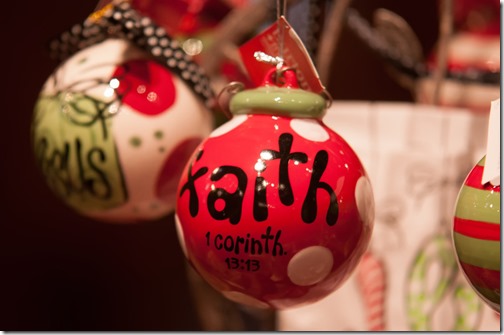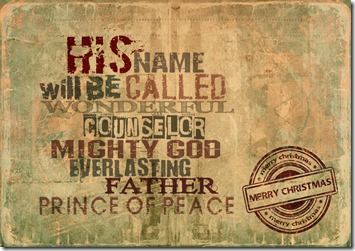
Christmas Faith
 It is back around 732 B.C.E. and Ahaz is king of Judah. He’s just a young man in his early twenties, but he was surrounded by some older advisors, among them the prophet Isaiah.
It is back around 732 B.C.E. and Ahaz is king of Judah. He’s just a young man in his early twenties, but he was surrounded by some older advisors, among them the prophet Isaiah.
Assyria is a rising power and is threatening the nations of the eastern Mediterranean coast. The kings of Syria and Israel, who stand between Judah and Assyria, have formed an alliance and are trying to get Judah to join them.
The Lord, however, frowns on such alliances.
“Don’t depend on other countries to defend you,” he says. “Depend on me.”
Syria and Israel gather their armies—and head south toward Judah. They want to force him to join their alliance. Isaiah then comes to Ahaz and warns him not bow to their threats.
Stand firm in faith. If you don’t stand firm in faith you won’t stand at all.
Isaiah isn’t telling Ahaz to be true to his doctrinal positions regarding the nature of God. He’s not telling him be believe certain facts about God without compromise.
That’s nothing. That takes no courage, no real faith.
Isaiah is telling Ahaz not to go to war and defend himself; trust that God will take care of things.
That’s fairly easy to do in theory, but when your enemies are gathering armies and heading your way, that’s another story.
We don’t know whether or not Ahaz believed Isaiah—whether or not he believed God—but we know he readied his army. That would seem to indicate unbelief, though many would say he was just being prudent. “I believe God, but I have a responsibility as king to protect the people and to be prepared for any situation.”
What he believed is ultimately irrelevant; it’s what he did that matters. If his gut told him that if he had to ready his army or he would be annihilated and then he didn’t ready his army—now that’s faith.
So Isaiah tells Ahaz to ask God for a sign, any sign, as assurance that God is serious about protecting him. Ahaz’s mind is made up, however, and he refuses to ask for a sign. With false piety he says, “I will not put the LORD to the test.”
You know, if God tells you to put him to the test, you better put him to the test.
But Ahaz refuses, and Isaiah responds:
“Hear then, O house of David! Is it too little for you to weary mortals, that you weary my God also? Therefore the Lord himself will give you a sign.
“Look, the young woman is with child and shall bear a son, and shall name him Immanuel.
“He shall eat curds and honey by the time he knows how to refuse the evil and choose the good. For before the child knows how to refuse the evil and choose the good, the land before whose two kings you are in dread will be deserted.”
The birth of this child would be a sign that God was on the side of Judah in this conflict and wouldn’t allow the invasion to take place.
Sure enough, a few months later the kings of Israel and Syria were dead and Assyria had deported much of their populations. It’s unclear from the context who the child was whose birth was to be a sign to Ahaz, but scholarly consensus points to Ahaz’s son Hezekiah, who would succeed Ahaz as King of Judah.
The ambiguity of the text allowed later generations after the Exile to look to this passage and see the coming of a future king whose birth would signal that God had forgiven the unfaithfulness that led to the exile of both halves of the divided kingdom.
Through this king God would establish an eternal kingdom, and there would be peace.
 Matthew tapped into this understanding when he applied this verse to Mary and Jesus. This interpretation of Isaiah’s prophecy was based on the conviction of the early Christians that in Jesus, God is actually present with his people.
Matthew tapped into this understanding when he applied this verse to Mary and Jesus. This interpretation of Isaiah’s prophecy was based on the conviction of the early Christians that in Jesus, God is actually present with his people.
One wonders if, in the expectation that there would be peace in this kingdom, the people understood that it would be a peace that comes not from having mighty armies readied to defend against all others, but rather from trusting that God would protect them. Apparently not, because many of Jesus’ followers still carried swords in anticipation of the ultimate and final conflict.
But Jesus understood, and told Peter—and the rest of us—to put his sword away. The Kingdom of God operates differently from the kingdoms of the world.
Christians are called to radical faith, to drop-your-swords-and-trust-in-God kind of faith.
Like with Ahaz, what we believe ultimately doesn’t matter as much as what we actually do.
What matters is if we trust God and actually drop our swords.
That’s the only kind of faith that gives God room to act as he promises.
That’s the only kind of faith that really matters.
Images by © Can Stock Photo Inc. / genotar © Can Stock Photo Inc. / digidreamgrafix
 I am a lifelong student of the Bible, and have been a pastor for over twenty-five years. My desire through this blog is to help people see things in the intersection of Scripture and real life that they might have missed. The careless handling of the Bible is causing a lot of problems in our churches and our culture--and is literally turning people away from the church, and, sometimes, God. I hope to treat Scripture with the respect it deserves, and, even if you don't agree with what I say, give you some insight.
Feel free to leave a comment. I promise to respond to you. All I ask is that you be respectful in your comments.
I am a lifelong student of the Bible, and have been a pastor for over twenty-five years. My desire through this blog is to help people see things in the intersection of Scripture and real life that they might have missed. The careless handling of the Bible is causing a lot of problems in our churches and our culture--and is literally turning people away from the church, and, sometimes, God. I hope to treat Scripture with the respect it deserves, and, even if you don't agree with what I say, give you some insight.
Feel free to leave a comment. I promise to respond to you. All I ask is that you be respectful in your comments. 
Connect with Me